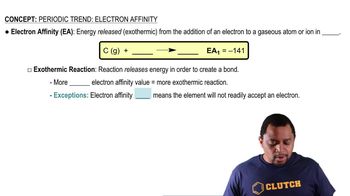Here are the essential concepts you must grasp in order to answer the question correctly.
Electron Affinity
Electron affinity is the energy change that occurs when an electron is added to a neutral atom. For most atoms, this process releases energy because the added electron experiences an attractive force from the positively charged nucleus, leading to a more stable electronic configuration. This release of energy is indicative of the atom's tendency to gain electrons and form negative ions.
Recommended video:
Ionization Energy
Ionization energy is the amount of energy required to remove an electron from a neutral atom. This process typically requires energy input because the electron is being pulled away from the attractive forces of the nucleus. As the electron is removed, the atom becomes positively charged, and the energy must overcome the attraction between the nucleus and the electron, resulting in an endothermic process.
Recommended video:
Stability of Electron Configurations
The stability of electron configurations plays a crucial role in understanding energy changes during electron addition or removal. Atoms tend to achieve a more stable state by filling or emptying their outer electron shells. When an electron is added, the atom often moves toward a more stable configuration, releasing energy, while removing an electron typically destabilizes the atom, requiring energy to overcome the attractive forces.
Recommended video:
Electron Orbital Stability
 McMurry 8th Edition
McMurry 8th Edition Ch.6 - Ionic Compounds: Periodic Trends and Bonding Theory
Ch.6 - Ionic Compounds: Periodic Trends and Bonding Theory Problem 70
Problem 70


